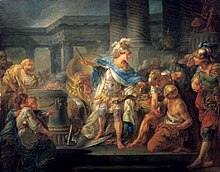Post Date
June,
28
2024
Who was Alexander the Great?
Alexander the Great, born in 356 BCE in Pella, Macedonia, was one of history's most renowned military leaders. He became king of Macedonia at the age of 20 and went on to create one of the largest empires in ancient history, stretching from Greece to Egypt and into northwest India. His conquests and the subsequent spread of Greek culture had a profound impact on the world, shaping the course of history for centuries to come.
The Early Life of Alexander the Great
Alexander was born to King Philip II of Macedonia and Queen Olympias. From a young age, he was tutored by the philosopher Aristotle, who instilled in him a love for knowledge, science, and literature. His early education laid the foundation for his strategic genius and his appreciation for the cultures he would later conquer. Alexander showed early signs of leadership and bravery, which were nurtured by his father, who also ensured he received military training.
How Alexander the Great Became King
Alexander ascended to the throne in 336 BCE after the assassination of his father, King Philip II. At just 20 years old, he swiftly consolidated his power by quelling rebellions and securing the loyalty of the Macedonian army. His early actions as king demonstrated his capability and determination, setting the stage for his future military campaigns.
Alexander the Great's Conquests
Alexander's military campaigns began with the invasion of the Persian Empire. His notable victories include the Battle of Issus, the Siege of Tyre, and the decisive Battle of Gaugamela, which led to the fall of the Persian Empire. He then advanced into Egypt, where he founded the city of Alexandria. Continuing east, he crossed into India, achieving a significant victory at the Battle of Hydaspes. Despite his success, his campaign in India marked the easternmost extent of his empire as his troops, exhausted and longing for home, refused to march further.
The Death of Alexander the Great
Alexander the Great died in 323 BCE in Babylon at the age of 32. The cause of his death remains a subject of speculation, with theories ranging from natural causes such as fever or malaria to possible poisoning. His premature death left his vast empire without a clear successor, leading to the eventual division of his territories among his generals, known as the Diadochi.

Alexander the Great as a Ruler
As a ruler, Alexander was both a visionary and a pragmatist. He adopted elements of the cultures he conquered, promoting a policy of cultural fusion and encouraging marriages between his soldiers and local women. This policy helped to integrate his empire and spread Greek culture, leading to the Hellenistic era. Despite his military prowess, he was also known for his temper and occasional ruthlessness, but his ability to inspire loyalty and his strategic acumen secured his place as one of history's greatest leaders.
The Importance of Alexander the Great in History
Alexander the Great is important to history for several reasons. His conquests spread Greek culture and ideas across three continents, leading to the Hellenistic period, which significantly influenced the development of Western civilization. His military strategies and tactics are still studied in military academies today. Moreover, his vision of a unified world influenced later empires and leaders, cementing his legacy as a pivotal figure in world history.
5 Fun Facts About Alexander the Great
- Alexander never lost a battle during his 15 years of conquest.
- He named over 70 cities after himself, the most famous being Alexandria in Egypt.
- Alexander's horse, Bucephalus, was so beloved that he named a city, Bucephala, after it when it died.
- He was reportedly a descendant of Achilles and Hercules.
- Alexander carried a copy of Homer's "Iliad" with him on his campaigns, considering it a guide to leadership.
Frequently Asked Questions About Alexander the Great
- What was Alexander the Great's full name? Alexander III of Macedon.
- How did Alexander the Great expand his empire? Through a series of military campaigns and battles, conquering territories from Greece to northwest India.
- What impact did Alexander the Great have on the world? His conquests spread Greek culture and ideas, leading to the Hellenistic era, which influenced the development of Western civilization.
- Who were some of Alexander's notable tutors? The philosopher Aristotle was one of his most famous tutors, influencing his love for knowledge and strategic thinking.
- What happened to Alexander's empire after his death? It was divided among his generals, leading to a period of conflict known as the Wars of the Diadochi.

